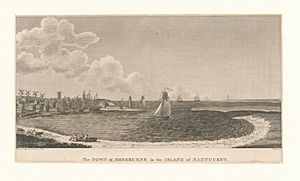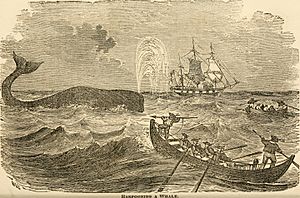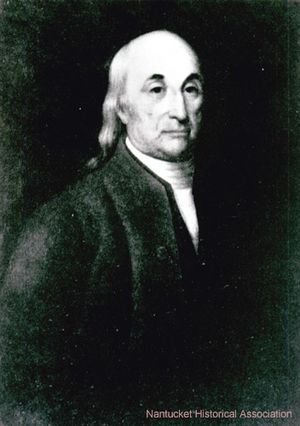Nantucket during the American Revolutionary War era facts for kids
During the American Revolutionary War, the people of Nantucket island relied heavily on whaling. They also depended on businesses that supported whaling and the trade of oil from whales. Since most of this trade was with England, the leaders of Nantucket decided to stay neutral. This meant they didn't pick a side between the American revolutionaries and the British Crown. They did this to protect their island's economy. Also, many people on Nantucket were Quakers, who believe in pacifism (peace and avoiding war). This was another reason why the island didn't get involved in the fighting.
Contents
Nantucket's Background
Nantucket is an island about 14 miles (20 km) south of Cape Cod in Massachusetts. When the British explorer Bartholomew Gosnold first saw Nantucket in 1602, about 3,000 Native Americans already lived there. In 1641, the island was given to a British settler named Thomas Mayhew. He kept a small part for himself and sold the rest to other British settlers for "thirty pounds…and also two beaver hats." The island's whaling industry became a very important part of colonial American history.
The Whaling Industry
The Nantucket Historical Association says that islanders might have seen right whales on their beaches as early as the 1690s. By 1715, they knew that sperm whales were also in their waters.
Why Whale Oil Was Needed
There was a big demand for good quality whale oils in the colonies and in Europe, especially in London. London was a very busy and modern city at that time. It had many factories and businesses. Because of this, London needed lots of light. In 1736, a program was started to add more street lights because there wasn't enough light, and this led to more crime.
Sperm whale oil was very popular. It didn't smell bad, gave the "clearest and brightest flame," and cost about the same as other oils.
How Whaling Grew
Many other businesses grew on Nantucket to support whaling. These included shipbuilding and making products from spermaceti (a waxy substance from sperm whales). Because of their good location and the need to make a living, many early settlers started hunting sperm whales in the early 1700s.
Herman Melville wrote in his famous book Moby Dick that the Nantucketers "overrun and conquered the watery world." By the time the American Revolution started in 1775, Nantucket was the top whaling economy on the Eastern Seaboard. It had become a very important trading partner for the British Empire across the Atlantic Ocean.
The Quaker Community
Many early settlers on Nantucket came from rural areas of New England. The island developed a very open and accepting social culture. This attracted many Quakers who were trying to escape religious persecution from the British. These Quakers became some of Nantucket's most important founding families. They often used their peaceful beliefs to influence local politics.
Important People
Two people, William Rotch and Timothy Folger, were very important in making sure Nantucket could keep trading.
William Rotch
William Rotch (1734-1828) was one of the most influential people on Nantucket in 1775. He was born on the island and inherited a lot of money from his father. This inheritance included two large shipping vessels, the Bedford and the Dartmouth. The Dartmouth is famous because it was one of the ships from which tea was thrown during the Boston Tea Party in 1773.
Timothy Folger
Timothy Folger was a well-known businessman on Nantucket during the Revolutionary War. He was a successful captain and was part of the groups sent to New York City and Philadelphia to talk about neutrality during the war. Folger represented Nantucket in both Massachusetts and New York from 1779 to 1782.
What Visitors Said
The French explorer St. John de Crevecoeur visited Nantucket in the early 1770s. In his 1782 book Letters to an American Farmer, he wrote about Nantucket's economic success, saying "what has happened here has and will happen everywhere else."
Thomas Jefferson also mentioned Nantucket in his 1788 book Observations on the Whale-Fishery. He wrote this book after the Revolutionary War ended in 1783. He described how successful the "Nantuckois" (people of Nantucket) were in helping Britain's whaling industry after the war.
Before the Revolution
In 1775, Nantucket was a key part of the Massachusetts Bay Colony, where many people wanted a revolution. The colony had been under a type of military rule for months. Nantucket itself had no military defenses and was far from the Massachusetts mainland. If the islanders had chosen to support either the British or the colonists, the other side could have easily taken over the island.
British laws, the importance of Nantucket's trade with Britain, and the Quakers' peaceful beliefs all led to the island choosing to be neutral.
British Laws
Historian Nathaniel Philbrick wrote that in early 1775, "Nantucket Island was mentioned repeatedly in the halls of Parliament." This shows how much Britain valued Nantucket's whaling exports. The British Parliament had passed laws, like the Massachusetts Bay Restraining Bill of 1774. These laws stopped trade out of Boston and banned fishing along the East Coast and in Newfoundland. However, Nantucket was specifically left out of these bans.
At that time, half of Massachusetts' whaling ships and half of its sailors were from Nantucket. The island could produce over 30,000 barrels of oil in just one year. If Nantucket had sided with the colonists against the British, the island's fisheries would have been included in these harsh laws and completely destroyed.
Why Trade Was Important
Nantucket's economy depended on selling whale oil to London, so keeping this trade going was vital. Many jobs on the island, like "merchants, blacksmiths, coopers, boat-builders, riggers, sailmakers, oil and candle manufacturers, carpenters, seamen," all relied on trade across the Atlantic Ocean.
British merchants knew how important this trade was and quickly worked to protect it. Robert Barclay, a Scottish merchant who supported Quakers, told Parliament in 1774 that Nantucket's spermaceti oil was essential for London's economy. He suggested that if Nantucket stayed neutral, trade could go directly to England, avoiding the rebellious groups in Boston.
Quaker Beliefs in Peace
Besides economic reasons, the Quakers' peaceful culture also played a role in Nantucket's decision to be neutral. Important Quaker families on Nantucket included the Macys, Coffins, Gardners, and Starbucks. They had a strong belief that "wars are wrong."
Historians have noted that the Quakers' "well-known aversion to war has proved a far better shield to them than fleets and fortifications could have been." This was important because Nantucket was "exposed on all sides, without a single fort, arsenal, or military company."
War Begins
By the summer of 1775, Nantucket felt pressure from both the American colonies and the British Empire. On July 7, 1775, the Provincial Congress in Philadelphia passed a rule to stop all trade with the British. This rule also said that no supplies could be sent from the colony to Nantucket until the islanders proved they weren't using their supplies for foreign trade.
The leaders of Nantucket wrote a letter to the Board of Massachusetts on July 14, 1775. They explained that most of the island's people were Quakers, "whose well known principles of Religion, will not admit of their taking up arms in a military way in any case whatever." The wealth from the whaling trade was also a quiet reason for their decision. These factors led Nantucket to favor neither the British nor the revolutionaries during the conflict.
Staying Neutral
By 1776, Nantucket's leaders had shown their commitment to neutrality. But both sides of the war still tried to pressure them. After some important Quaker families moved to the mainland, Nantucket sent a committee of Benjamin Tucker, Timothy Folger, William Rotch, and Samuel Starbuck to Newport, Rhode Island and New York City. They wanted to talk with British commanders to make sure trade could continue without problems. They reached an agreement that "the depredations would cease, provided the Town of Nantucket would observe strict neutrality."
In December 1778, a British ship crashed on Nantucket's coast. Timothy Folger helped the shipwrecked British soldiers by giving them small boats and supplies to get safely to New York. The British also cooperated with the islanders. In April 1779, British loyalist forces came to Nantucket with orders not to harm local citizens, but only to "destroy rebel property wherever it be found."
Nantucket's continued trade with the British, even after declaring neutrality, made authorities in Massachusetts question their loyalty. So, on September 25, 1782, Nantucket held a town meeting. They wrote a letter to the Court of Massachusetts explaining their economic challenges and their wish to stay neutral. The town clerk, Frederick Folger, signed the letter. The letter also addressed rumors that Nantucket had secretly continued to trade with New York City.
In the following weeks, William Rotch and Samuel Starbuck were sent to Philadelphia. In the winter of 1782, an official Agreement of Neutrality was written, signed, and made into law. One expert noted that "Nantucket struggled through the war and experienced considerable prosperity after the proclamation of peace."
 | Calvin Brent |
 | Walter T. Bailey |
 | Martha Cassell Thompson |
 | Alberta Jeannette Cassell |




